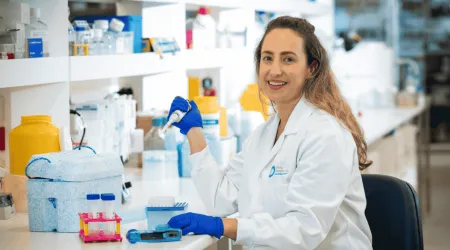


What is the PIK3CA biomarker?
PIK3CA is a gene that is involved in several different processes in cell growth. A PIK3CA mutation is a driver mutation that drives the growth of cells.
It exists in many types of cancer and in 10-20 percent of colorectal cancers.
It is a somatic (acquired) mutation that occurs only in cancer cells. It is not a hereditary (germline mutation) and does not pass from generation to generation in a family.

Who should have PIK3CA biomarker testing?
Routine testing for the PIK3CA biomarker is not currently recommended.
If you are diagnosed with stage IV (metastatic) colorectal cancer and have comprehensive biomarker panel testing done on your tumor through genomics analysis like Next Generation Sequencing (NGS), PIK3CA will be part of the panel.

What happens if I have the PIK3CA biomarker?
A mutation in the PIK3CA gene is a prognostic biomarker for aggressive tumor growth.
Patients with this mutation have an increased risk for the tumor coming back (recurring).

What treatment options are available?
Patients with PIK3CA-mutated colorectal cancer should receive standard chemotherapy.
There is at least one drug being used successfully in PIK3CA-mutated breast cancer and it has opened up clinical trials for other PIK3CA-mutated solid tumors, including colorectal cancer.

What are potential side effects?
Every treatment has the potential to cause some side effects. Some people may be more sensitive than others to a drug. The response to a specific treatment also depends on your medications, vitamins, and herbal supplements.
Tell your doctor about all your medications, vitamins, supplements, and treatments.
Contact your doctor immediately if you are experiencing severe symptoms.
Other biomarkers
PTCH1 BiomarkerTop resources

Where breakthroughs begin: Project Cure CRC spotlight on Dr. Lisa Mielke
hrough Project Cure CRC, the Alliance is fueling bold, early-stage research with the potential to transform colorectal cancer treatment. Dr. Lisa Mielke’s groundbreaking work explores how the gut’s immune system and nerve signaling influence cancer growth—opening the door to new therapeutic approaches, including repurposed existing drugs. This is what’s possible when promising ideas get the support they need to move forward.

Bringing biomarker testing within reach: CLEAR for CRC to empower patients from day one
Biomarker testing can guide colorectal cancer treatment and improve outcomes. Learn how CLEAR for CRC is helping patients access this critical tool.

John E.: Biomarker testing uncovered a pivotal treatment option
After a grim prognosis, biomarker testing revealed a targeted treatment option for John E. Learn how knowing your biomarkers can change what’s possible.





